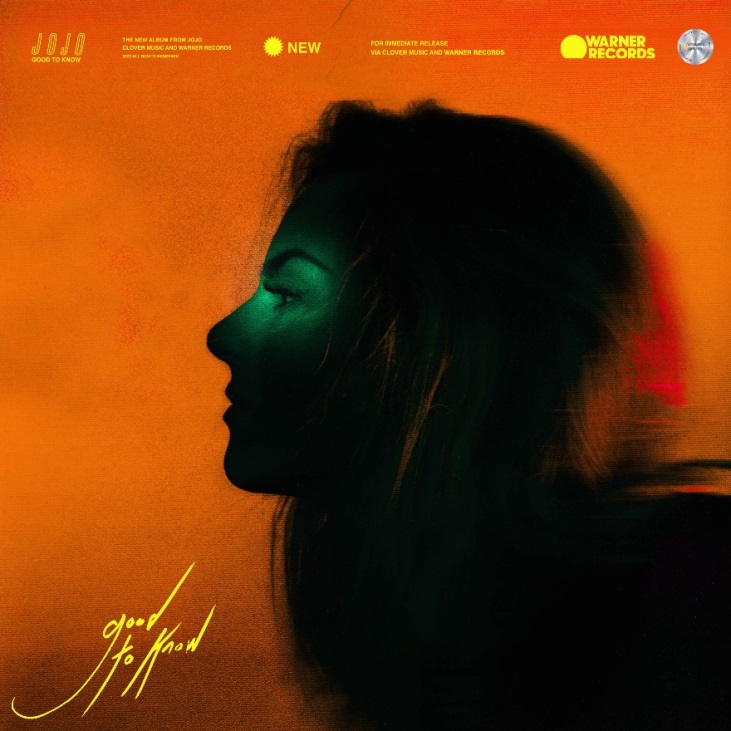 Andrew Chan
Andrew Chan
The singer returns with an after-hours album.

JoJo. Image courtesy Warner Records. Photo: Dennis Leupold.
Good to Know, by JoJo, Clover Music / Warner Records
• • •
Even when a singer’s technical prowess is evident from the start, the road to becoming a truly interesting musician can be a difficult and unpredictable one. This has been the case with JoJo, whose sixteen-year-long career has perpetually positioned her on the brink of potential. At thirteen, she held the record as the youngest female solo artist to score a number-one hit, thanks to her ubiquitous debut single, “Leave (Get Out).” But the remainder of her adolescence found her caught up in some brutal record-company turmoil that silenced her for years. And since her early style—light-hearted, R & B–inflected pop—had failed to distinguish her from the glut of teen acts that dominated the charts at the turn of the millennium, there didn’t seem to be much her prodigious pipes could do to save her.
First, a word on those pipes. Born in 1990, practically under the sign of Mariah Carey (whose reign began that year), JoJo soaked up the tendencies of a golden age of R & B that fetishized agility above all else—and pushed it to its outermost limits. In other words, the young singer could nail elaborate trills at lightning speed, articulate tongue-twisty phrases over skittering hip-hop beats, and switch seamlessly between a piercing wail and a fluttery falsetto, all in a pleasingly nasal timbre that’s very much her own. That she wasn’t marketed from the beginning as a capital-V vocalist (like Mariah herself had been) goes to show just how de rigueur those skills had become in American singing by the time she hit the scene.

Over the past decade, JoJo’s deepening mastery has earned her a following among voice cultists, the type who like to analyze melismata and high notes the way a baseball fan might obsess over batting stats. On her excellent new album, Good to Know, her instrument is as supple and complex as ever, though many of the songs aren’t ostentatiously voice-forward. This is an after-hours record, and the focus has wisely been placed on atmospherics instead of theatrics. In the first few tracks, there’s also a narrative element that suggests she’s had her ear on the currents of recent R & B, which have shifted the genre’s emphasis away from vocal pyrotechnics toward moodier, loopier approaches to storytelling.
JoJo (who cowrites most of her material) isn’t a natural innovator, so the melodies and structures here are still quite traditional. But the cheekily titled “Pedialyte” recalls modern touchstones like Frank Ocean’s “Pyramids” in the way it narrates a nightmarish odyssey through various states of intoxication. “Excuse my behavior,” she slurs on the chorus, her vocals multitracked into a choral chant enveloped by chimes. By the end of the song, the tempo has changed twice, and her voice has been chopped up into spooky little fragments of sound.
If “Pedialyte” ends up feeling a bit forced, it still points to an alternative JoJo who has already existed for some time at the edges of the spotlight. The mixtapes and singles she dropped while in label purgatory may not have been fully coherent statements, but they foregrounded her attraction to a range of styles that were absent on her biggest-selling releases. She enlisted help from genre-straddling bassist Thundercat; covered both Joni Mitchell and Anita Baker; and dipped into Janet-reminiscent kink in “Demonstrate,” a collaboration with influential Toronto producer Noah “40” Shebib. She’s never settled into a sustaining, well-balanced partnership, as Aaliyah did with Timbaland and Usher did with Jermaine Dupri. But on Good to Know she shines brightest with a handful of beatmakers who haven’t yet become brand names.
Noise Club and A Pluss are behind two standouts, “Gold” and “Small Things,” both of which kick off with richly layered, reverb-sweetened a cappella harmonies that call to mind quiet-storm Mariah of the mid-nineties. These intros are so lush and velvety, it almost doesn’t matter what follows, but each song succeeds in its own way: “Gold” is a cathedral erected in honor of the female orgasm, while “Small Things” infuses high school–diary sentiment with fresh ache. The Norwegian producer Lido shows a similar understanding of how to frame JoJo’s voice. On “Don’t Talk Me Down,” he wraps the album’s bluesiest performance in a stark arrangement of strings, piano, and Hammond organ. It’s a deep-soul number that would have been hard to imagine in her commercial heyday, during which she seemed to deliver even the coldest kiss-offs with an obligatory smile plastered on her face.

JoJo. Image courtesy Warner Records. Photo: Dennis Leupold.
Most infectious of all is “Man,” a teasing seduction jam produced by Fade Majah and BeatGodz that turns out to be more about self-sufficiency than pursuit of the title subject. And it’s here that something like a theme crystallizes. Whether in an earnest attempt at transparency or in an effort to package her new music for the press, JoJo has talked about Good to Know as the product of a nearly yearlong period of celibacy and reflection, inspired by a messy relationship. This may be why it comes across so vividly as a breakup record, even on upbeat tracks where separation isn’t the topic at hand.
What role should love and sex play in our lives? What do we do with ourselves when the party is over? Who are we when we’re grown-up, eligible, and all alone? These are not new questions in music of any kind, but the tangle of moods that JoJo draws from them reveals a singer grappling with a specific set of dilemmas—not something that can be claimed for a lot of her pop peers. This is the first time since the 2012 fan favorite Agápē, a mixtape on which she confronted her industry woes head-on, that she’s come across as a musician working through something that’s been weighing on her mind.
Still, there’s nothing remarkably conceptual about Good to Know. Music criticism tends to privilege work that seems, at least on the surface, to move things forward, but there’s not much of a think piece to be spun out of someone like JoJo—she’s not a convenient symbol for anything. And yet, for those still listening, her career has been a lesson in the slow-burning pleasures of staying faithful to a talented artist who may not have emerged out of the gate fully formed but has since developed a sound that fits. If plenty of fans have stuck around to hear that sound, it’s partly because there will always be an audience for a voice like hers, one whose capacity to dazzle never smooths over the conflicting emotions it exposes.
Andrew Chan is web editor at the Criterion Collection. He is a frequent contributor to Film Comment and has also written for Reverse Shot, Slant, Wax Poetics, and other publications.